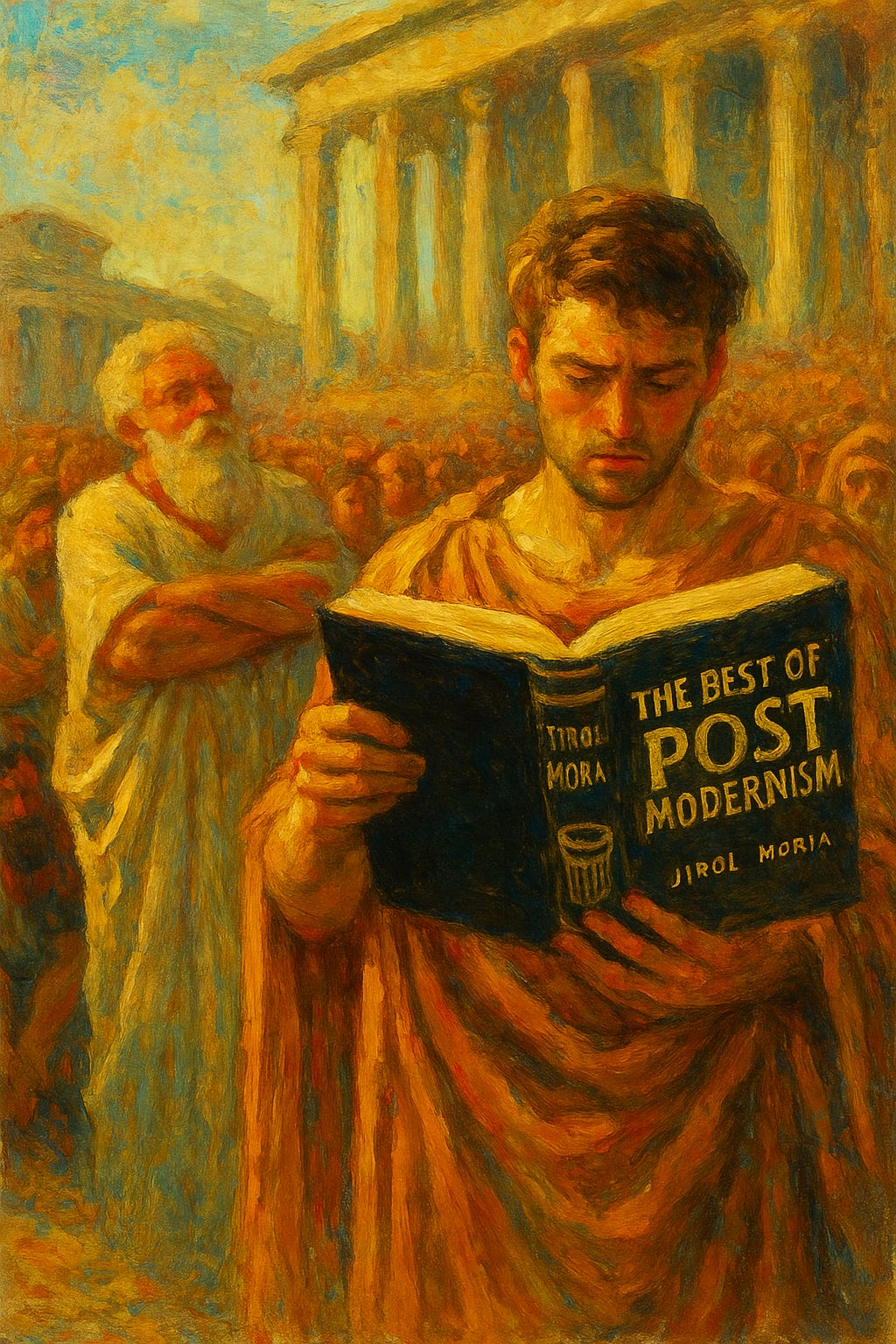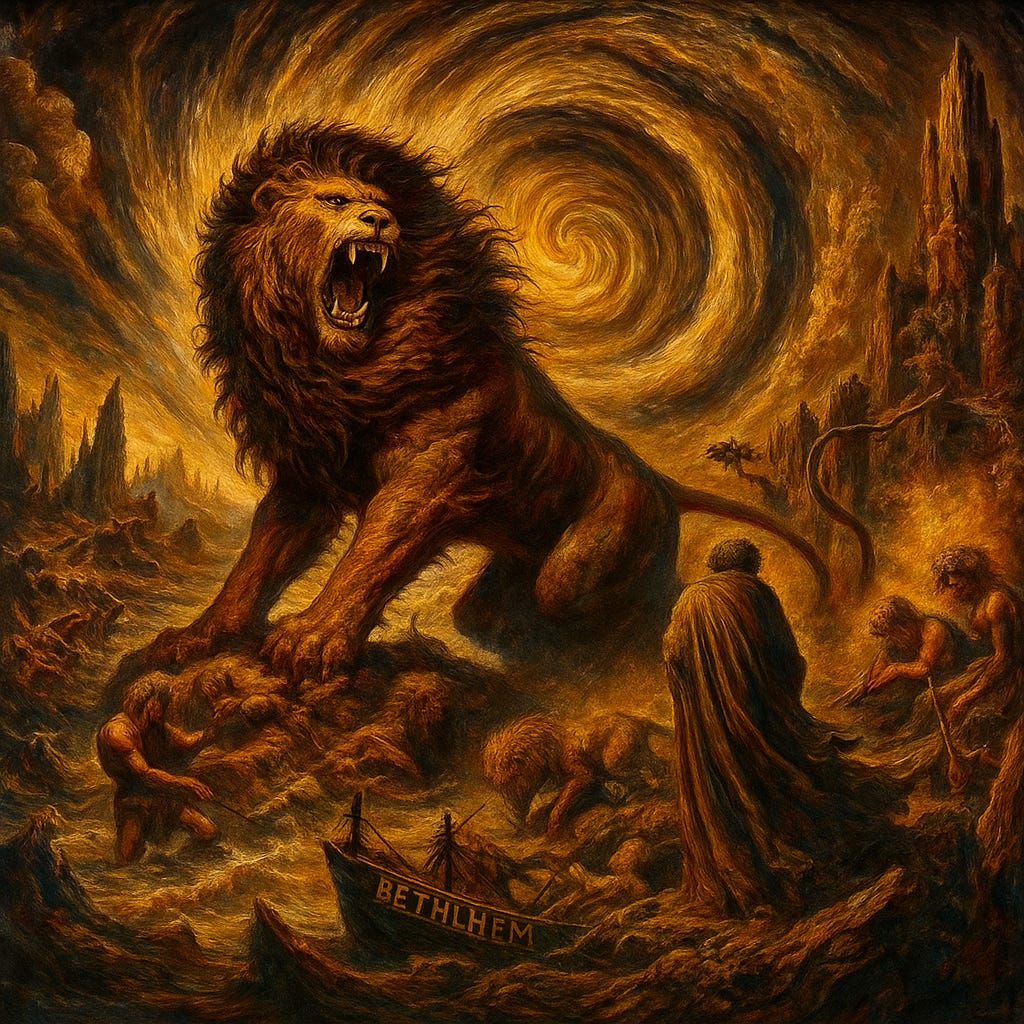Pontius Pilate was ahead of his time.
From Foucault to Faucets in the Men’s Room: How Postmodernism, Moral Vanity, and Bureaucratic Cowardice Replaced Truth with Rules, and Made Heresy the Only Honest Position
If you give even half a damn about free speech, subscribe. It means I can continue doing this without needing to ask a gender-neutral AI for spare change. I’m a suspended university professor, not a pundit barking from the cheap seats. The link is below, click it before the lawyers take it away.
Please subscribe to get at least three uncensored, impolite, fire-in-the-belly essays per week. Open comments, $6/month. Less than \ $4USD. Everyone says, “That’s just a cup of coffee.”
Well, then order mine.
Pontius Pilate Was Ahead of His Time
Sarcastic? Of course. But let’s clarify right off the top: this is not, repeat ‘not’, an endorsement of Pontius Pilate. For Christians—and Nazis—who lazily mutter about "Christ killers," a small reminder: if Jesus *hadn’t* died, according to your scriptures, you’d all be roasting on Satan’s hibachi. Source: Bible.1
“What is truth?” Pilate asked, presiding over history’s most famous show trial. I wasn’t there (despite what my students joke), but I’ve played the part of ancient relic.
Nobody recorded Pilate’s “What is truth?” No stenographer, no parchment, no receipts. Yet that cynical shrug of a question has become the eternal koan2 for our dying age of reason.
Theologians have wrangled over its meaning for centuries. But theology now seems about as powerful as Blockbuster’s late fees. The postmodernists have won. Foucault—Michel, not the physicist—is the new Christ.
Truth, he claimed, isn’t a thing. It’s a ‘process’, a confection made from cultural norms, systems of power, and whatever the ideological kitchen has on hand that week.
But try explaining that in a TikTok. Truth that can’t be memed dies in obscurity.
Power now goes to those who write the rules—and ensure those rules fit within 30 seconds or less. Pilate, it turns out, was just a bald, sandal-wearing Foucault. His point? Truth isn’t absolute. It’s what survives the hour’s power play. It’s what they let you say—until they don’t.
“What is truth?” Pilate asked, washing his hands of both the question and the man before him.
But let us not be fooled into romanticising the moment. He wasn't being profound; he was being cowardly. He asked the question not as a philosopher, but as a bureaucrat with a conscience to smother. And like many bureaucrats today, he found the truth inconvenient, disruptive, and, above all, dangerous. The modern university has not evolved much beyond this.
Once, when some students made cracks about my age, I told them I fought in the First World War. The class spiralled from there, as any honest class does. By the end, I was claiming to know Jesus personally and speculating, quite sacrilegiously, on the status of Mary’s hymen. Yes, it was offensive. Yes, it was probably wrong. But damn it, it was funny—and more importantly, it was true in the way all irreverent humour is: revealing.
That, of course, is why it would get me fired today.
No one recorded Pilate’s actual words. The Gospel has him say, "What is truth?" But if he’d asked that in a modern campus seminar, he’d be praised for his critical thinking, offered a fellowship, and invited to join a post-structuralist book club. For Pilate, the question was rhetorical. For Michel Foucault and his giddy disciples, it became revolutionary.
Truth, to Foucault, was never something fixed or noble—it was just the residue left behind by power once it had marked its territory. In Foucault’s world, truth is an effect of regimes, a construction of the powerful to maintain their dominion over the poor suckers who read books and believe in objectivity. There is no enlightenment ladder here—no Newtonian step-by-step ascent to knowledge. Just spirals, swamps, and Möbius strips, where nothing is ever settled except who gets to cancel whom.
And what do we get in 2024? Postmodernism with a TikTok filter. Thirty-second hysterics masquerading as thought. Ideas repackaged into attention-seeking bytes—bitten off, chewed up, and spat out as PowerPoint slides about diversity, equity, and inclusion, which now serve as the trinity of truth production in the administrative church of higher indoctrination.
The danger of Pilate wasn’t that he didn’t know the truth—it’s that he no longer believed it mattered. Foucault took that to its logical conclusion: truth is nothing but the name we give to the lies with institutional backing.
That’s why today’s moral crusaders don’t fight over what’s true; they fight to decide the rules that determine who gets to define it. Truth doesn’t defeat power—it gets mugged by it.
If you can’t explain it in a tweet, it doesn’t exist. And if it hurts someone’s feelings, it shouldn’t be said. Violence, after all, has been redefined—no longer a physical act, but a psychological vapour that floats in on the wings of disagreement. To disagree now is to attack. And to question the rules? Heresy.
So yes, Pilate was a postmodernist avant la lettre. Truth? A temporary consensus. A holding pattern. A façade. Something the dominant caste projects onto the wall while flogging dissenters behind the curtain. It’s no wonder our modern mandarins want the classics purged—who needs the chaos of nuance when you’ve got a DEI rubric and a trauma trigger warning to get through?
But back to Foucault. I had to read to him. I had no choice. He was mandatory for my English MA—four solid hours wading through his Gallic fog. I chose Marx instead—at least he believed in causality, however stupidly. Yet Foucault lingered like a wine stain—every seminar, every textbook, every smug grad student nodding along as if power analysis were a sacrament.
If I wanted to become the most overqualified McDonald’s employee in Canada, I had to comply.
And comply we do, now more than ever. We comply with the weaponisation of words. The elevation of linguistic ambiguity into moral law. It’s not just censorship anymore—it’s enforced incoherence. Language is no longer a tool to express thought; it’s a cage designed to prevent it.
It used to be that you could say something outrageous and spark a debate. Now, saying something true that makes someone uncomfortable is, in itself, a sin. Truth has no defence in a world ruled by feelings. And God help you if those feelings belong to someone clutching a grievance checklist and a minor in Critical Victimology.
The new catechism reads: racial identity is original sin (if you're white, you must find an albatross to hang about your neck), gender is a construct (unless declared otherwise in PowerPoint font size 72), CO2 is violence, and speech is assault. Lived experience is your trump card, and if you don’t have one, shut up. Preferably forever.
This is not education. It is a catechism by cattle prod—a seminar in self-loathing administered by the morally smug and intellectually bankrupt. You are not learning—you are being processed. And once processed, you are expected to repeat the same catechisms to others, or at the very least, keep your heresies to yourself.
I once mocked the notion that the Enlightenment was in retreat. Now I see that it has been boarded up; its furniture was sold off by DEI consultants with clipboards and no qualifications. Orwell warned us in 1984 that the purpose of Newspeak was not just to constrain vocabulary, but to eliminate thought itself.
That is no longer fiction. It’s policy.
And don’t for one second think Jews are exempt from this orgy of ideological revisionism. They are, in fact, its preferred target. Anti-Zionism, we are told, is not anti-Semitism. No, it’s just an incredibly specific critique of the one Jewish state, somehow untouched by the same standards applied to, say, China, Syria, Iran, Russia, or Venezuela.
What does it tell you when people can list every grievance against Israel with theological precision but can’t name a single dead Uyghur, or draw a map of Chechnya? That’s not politics. That’s an obsession. That’s hate with a new haircut.
We were told "Never again." We said it like a prayer. However, it turns out to be more of a slogan. A bumper sticker. A limited-time offer. The Jews got a few years of pity, then back to pogroms—this time online, on campus, and in the gleaming temples of equity.
No wonder some of us turn to Krav Maga. It’s not just a martial art—it’s the new apologetics. Because when truth is denied, and speech is throttled, and rules become the playground of tyrants, sometimes the only way left to say “I exist” is with your elbows.
And still they sneer. Still, they tell you to check your privilege, to apologise for your skin tone, your sex, your history. Still, they hand you pamphlets on settler colonialism, as if they came with the deed to Eden itself.
Still, they demand that Israel apologise for surviving, for defending, for daring to be.
But I remember Auschwitz. I remember standing on the stones where the blood was sluiced away. I remember those who died nameless, faceless, because the truth about their humanity was inconvenient. I remember the lie told then: they were not people.
Just as now, we are told that Israelis are not victims, only oppressors.
The truth has never been more endangered. And Pilate’s question has never been answered. The truth is what the powerful say it is. That’s why we must defy them. Not with slogans, but with thought. With clarity. With courage. With reason—and yes, if necessary, with resistance.
Let postmodernism be crucified, and let truth rise in its place.
We’ve had enough Pilate—time for some damn resurrection of the truth.
If you found value in this article and wish to support my ongoing work, especially during my 18-month suspension, please consider leaving a tip. Your support helps me continue producing uncensored content on critical issues.
Pretty much the entire new testament retard.
A koan (pronounced koh-ahn) is a paradoxical riddle or question used in Zen Buddhism to provoke deep thinking and spiritual insight, often beyond rational or logical thought.













Brilliant writing and remarkable insight, such as: “Lived experience" can become a code word for, "You're not me; shut the f*** up." Most of these pillar words might as well end with, "Shut the f*** up, or we will fire you." It's incredibly anti-intellectual and against any pretence of open inquiry, which used to be at the centre of education. It fits nicely with a post-modern perspective.
I wonder when anyone will notice footnote #1